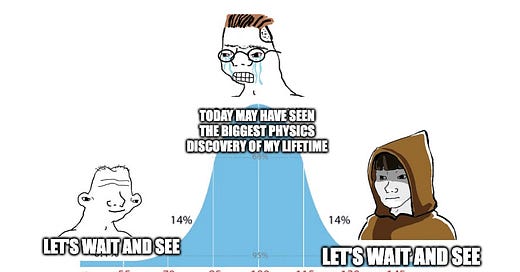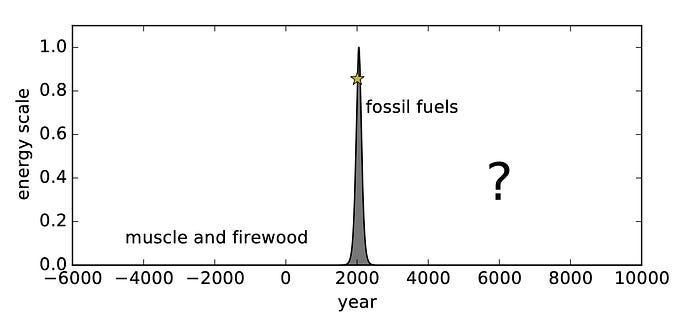Mind Expanding 28 Jul 2023: an emergent property of physics🧠💡post-anthropocene⏳EU nature restoration law🍃the metabolic era🙈dark stars🌌
🌳AI thinks we’re like trees
Mind Expanding is my ~fortnightly curation for Memia subscribers of links to deeper dives and bigger thinks and other eclectica that I’ve come across while compiling the weekly newsletter. Thanks for reading!
In today’s post:
🤔Wait and see waiting for this week’s potentially world-changing room-temperature superconductor results can be replicated…
📈On intelligence
🧠Determined more by brain shape than connectome?
💡An emergent property of physics?
🌳Will AI look at slow-thinking humans as we look at trees?
⏳Post-Anthropocene physics, humanism and population collapse
📰Headline grabbing more curious news algorithms
Miscellany other links including:
🍃The EU’s ambitious new nature restoration law
🙈A metabolic future with continued plastic waste
🌌Supermassive dark stars in the early universe?
📚Reading list book recommendations including the self-assembling brain and futures with AGI
🤔Wait and see
Like everyone I’m tracking the potentially world-changing hype around the announced discovery of room-temperature. ambient-pressure superconducting material by scientists in South Korea… more in next week’s Wednesday newsletter once the dust settles. Can the results be replicated?
On intelligence
Three illuminating perspectives on intelligence:
🧠Brain shape
A recent study published in Nature claims to overturn the century-old paradigm of how brains work, identifying that the overall shape of an individual’s brain has a far more substantial impact on our cognitive processes, emotions, and behaviour than its intricate neuronal connectivity.
The research contrasts “eigenmodes” of brain geometry against those of the traditional connectome:

💡Emergent property of physics
Sam Altman knows a thing or two about (artificial) intelligence:
(The heritage of this concept goes back at least 34 years, to an essay in The Long Now Foundation: Intelligence as an Emergent Behavior or, The Songs of Eden by American inventor Danny Hillis.)
🌳AI thinks we’re like trees
The most profound insight on AI accelerationism that I’ve come across recently:
⏳Post-Anthropocene
As we officially enter a phase of “global boiling” (saving that for Wednesday’s newsletter, too…), some perspectives on the “Post-Anthropocene” era:
Post-Anthropocene physics
From 2021, University of San Diego physics professor Tom Murphy’s textbook Energy and Human Ambitions on a Finite Planet: Assessing and adapting to planetary limits is an accessible guide to the physical constraints which are yet to significantly permeate any of our societal or economic thinking:
“Where is humanity going? How realistic is a future of fusion and space colonies? What constraints are imposed by physics, by resource availability, and by human psychology? Are default expectations grounded in reality?
This textbook, written for a general-education audience, aims to address these questions without either the hype or the indifference typical of many books. The message throughout is that humanity faces a broad sweep of foundational problems as we inevitably transition away from fossil fuels and confront planetary limits in a host of unprecedented ways—a shift whose scale and probable rapidity offers little historical guidance.“In one picture: what comes after fossil fuels?
One review of the book gets straight to the point: How, precisely, we’re fucked:
“We have grown up on the side of going up, but we will die in the age of coming down. At the end of our lives, our lifestyles will end with us. What goes up must come down. Like good old junkies, we believe that another fix is around the corner. We think it’s renewables, we think it’s green energy, that if we just unite to stop carbon emissions, we can go on like before. But carbon is just one problem. As math tells us, if we keep using more and more energy to power AI and virtual worlds and blast off to space, we’ll boil the oceans even if that energy is renewable. We can’t keep growing forever. On a finite planet, it’s just not physically possible.“
(This seems absolutely fundamental to understanding humanity’s future: I plan to go deeper here to understand Murphy’s arguments against feasibility of nuclear fusion and space-based solar in particular…join me.)
Post-Anthropocene humanism
An essay from Editor-in-Chief Nathan Gardels in Noema magazine, Post-Anthropocene Humanism:
“…what will become of human centrality as our species is knocked off its pedestal by machines more intelligent than we are and de-centered by the humbling realization that survival depends on reducing our outsized footprint on this fragile planet?
The vise [vice] of these two developments is prompting a rethinking of what humanism might mean in the oncoming future.“
Including a note on the thinking of the prescient James Lovelock who died 1 year ago:
Keep reading with a 7-day free trial
Subscribe to Memia to keep reading this post and get 7 days of free access to the full post archives.









